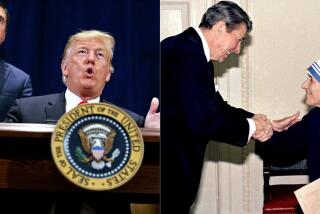If Reagan <i> Was </i> Ignorant, We’re All Paying for It
- Share via
President Reagan’s sigh of relief after listening to three days of testimony by his former assistant for national security, John M. Poindexter, is premature. The Poindexter testimony raises as many questions as it appears to have answered.
On Wednesday Adm. Poindexter mentioned “one or possibly two” other covert actions that were retroactively approved by the President. If true, these operations are as illegal as the Iran- contra operation was, and cast further doubt on the integrity of the CIA and on the finding of the Tower Commission that this episode was an “aberration.”
Equally significant, the admiral’s testimony was called “astonishing” by Henry A. Kissinger, who was probably the most powerful presidential assistant in U.S. history. Kissinger has said that he never dreamed of running covert actions without first informing President Richard M. Nixon. It was also questioned by some members of the committee who find it very difficult to believe that a military officer without political experience or without an independent power base and whose entire career involved the cardinal principle of reporting up the chain of command would choose not to do so in this one instance because the matter was too politically sensitive.
At a minimum, Poindexter must have been at least tempted to consult others from whom the committee has not taken testimony--like former White House Chief of Staff Donald T. Regan or the late director of Central Intelligence, William J. Casey, who may have secretly taped his conversations.
It is also surprising that a person with Poindexter’s background would knowingly choose to violate the law, which in this case requires the President’s personal approval for covert operations.
Whether the hearings ahead will get to the bottom of these issues is doubtful. The process does not work well.
Some witnesses, like Lt. Col. Oliver L. North and Assistant Secretary of State Elliot Abrams, have treated it as theater. Others, like former presidential assistant Robert C. McFarlane, appear to think of it as an opportunity for academic debate on the nature of executive-legislative relations.
The lawyers on both sides often appear more interested in scoring points off each other than in discussing what happened and why. And only some senators and congressmen appear to have really done their homework and zeroed in on both the key questions to ask and how to ask them within the time allotted.
Nevertheless, the Iran- contra hearings have provided the nation with a lesson in civics.
The seemingly endless hours of questions and answers about the functions and responsibilities of an until recently very obscure National Security Council staff and the meaning of the memoranda produced and circulated by its members reveal what most textbooks on government do not--that the foreign policy at the highest levels of the U.S. government is controlled by officials who are neither elected nor confirmed by or subject to (except in extraordinary circumstances) questioning by Congress.
We have learned that this government within a government acts independently of the State and Defense departments and permits some very low-level officers like a lieutenant colonel in the Marines and his secretary to feel that they are above the law and some very high-level officers to act first and then prepare documents to cover their tracks.
We have also learned that, even with weapons like the series of Boland amendments that should have applied to the National Security Council staff, Congress can do little to regulate these officials and the actions that they take. We have thus also learned that in foreign policy, especially, there is no substitute for presidential leadership.
When leadership is either ambiguous or lacking, other White House officials feel licensed to act. So to this observer the answer to the question of what the President knew about the Iran-contra affair is “not enough.”
While the hearings have made heroes of some and may vindicate others, the nation has paid a very high price for Ronald Reagan’s ignorance.
More to Read
Get the L.A. Times Politics newsletter
Deeply reported insights into legislation, politics and policy from Sacramento, Washington and beyond. In your inbox twice per week.
You may occasionally receive promotional content from the Los Angeles Times.







